- Home
- H. L. Burke
Cora and the Nurse Dragon
Cora and the Nurse Dragon Read online
Cora and the Nurse Dragon
H. L. Burke
For information about H. L. Burke's latest novels, author news and events, or to contact the writer, go to
www.hlburkeauthor.com
and sign up for the author's newsletter!
Copyright © 2015 H. L. Burke
All rights reserved.
Cover Illustration by Jennefer Rogers
Cover Layout by Jennifer White k12
This book is dedicated to Cora and her mother, Bethany, who faced trials I couldn't even imagine and came through them with grace and courage I could only hope to possess.
Chapter One
Race Day
Twelve-year-old Cora tugged at her best friend Abry’s arm. “Come on! We’re going to miss the post parade.”
Abry shifted her books from her hand to the crook of her elbow. She blew upwards, pushing her pale hair out of her red face. “We aren’t allowed at the track, anyway. Why hurry when we can’t even get inside?”
Cora winked. “Who said anything about getting in?”
She’d discovered her new perch only the day before and had been dancing on pins, she was so eager to share it with Abry. Of course, Abry’s mother wouldn’t approve. The track was not a place for decent folk, too much gambling. Because of this, Abry had told her mom they were going to the library … and then in typical Abry fashion, insisted on actually going to “reinforce their alibi.”
A mechanical buggy rattled down the dirt road, its engine coughing and sputtering. The girls darted into an alley between two warehouses. A scraggly, yellow cat hopped on top of some rusty fuel barrels and arched its back at them. The alley had a sour smell, suggesting many more lurking cats.
Abry wrinkled her nose. “Are you sure we're going the right way? There might be rats here. Rats can have rabies.”
“It’s my new shortcut. Don't worry.” Cora chuckled. Abry had read a novel about a nurse earlier that week, and since then everything carried disease. Her obsessions always reflected whatever she'd been reading, causing them to change several times a month. Hopefully her next book would be about pirates or something interesting.
At the end of the alley, they turned down an empty road of equipment garages, all bolted shut. On her last walk through, Cora had scrambled up a stack of crates to gaze through one building's high windows and found trucks, cloth-covered automobiles, and farm equipment with blades from her nightmares. A plaque claimed the interiors of these buildings were “Property of Algernon Investments” and threatened severe repercussions for trespassing and vandalism. It also claimed the premises were guarded, but she hadn’t seen any signs of that. Half the town belonged to Mr. Algernon, so maybe he only bothered to protect the really valuable things. These warehouses appeared to be abandoned; the chains on the doors were rusty, and dust and cobwebs shrouded the windows.
The road dead-ended at a tall chicken wire fence, with a weed-choked field beyond. Cora rolled up the bottom of the fence, making a two foot gap. “You’ll have to get down on your belly."
Abry’s nose wrinkled again. She slipped off her sweater and carefully wrapped it around her books.
Cora rolled her eyes. “I get why you wanted to stop at the library, but did you have to check out so many darn books?”
Abry shrugged. “Mom’s not stupid. If I didn’t bring back books, she’d suspect something.” Getting down on her hands and knees, she pushed the books to the other side, then wormed her way through.
Cora followed, the chicken wire scraping against the rough fabric of her coveralls. Though sometimes she envied Abry for her mother’s attention, it was nice to have a father who didn’t care what she wore. Her canvas coveralls had been Dad's when he was a boy. A little too big, but she’d rolled up the sleeves and stuffed the legs into her likewise over-sized work boots. It was all much more practical than Abry’s flowery, cotton dress.
She did wish her father would let her cut her unmanageable, dark curls into a fashionable bob like Abry had, though. The one time she’d asked, he’d brought out his garden clippers. Dad had thought that was so funny.
Cora and Abry cut through the field. Abandoned farm equipment and rusty car fenders stuck out of the earth between the knee-high grass and patches of thorns.
“You come here often?” Abry raised a nearly invisible eyebrow.
“People throw out good stuff.” Cora scooped down for a twisted length of wire and twined it about her hand.
“This is how people get lockjaw.” Abry shook her head. “Is this where you come when you aren’t at school?”
“Sometimes.” Cora didn’t want to go into more detail. Abry was a good friend, but she had an odd sense of right and wrong and didn’t understand about the importance of not-telling. She often wouldn't agree to Cora’s games because she felt they weren’t “safe.” Still, she was the only girl in their class who didn’t like to point out the dirt under Cora’s fingernails or tell her she smelt like fertilizer and motor oil. Abry said Cora was brilliant and unique when the other girls called her odd and “boyish.”
They pushed through the weeds. The remnants of an abandoned farmhouse stuck out of the earth like stone teeth. The girls scrambled over the short stone wall around the yard, and Abry’s eyes widened. She pointed to a two-story wall that butted up against the back of the meadow like a massive fence. “That’s the stadium, isn’t it?”
“The back side.” Cora smiled. She nodded towards a huge maple tree, towering over the wall. Its branches curled over the top like reaching arms.
“I don’t know if I can climb that.” Abry bit her lip and glanced down at her shiny school shoes. “Would barefoot be better?”
“Don’t worry about it. It’s easier than you think.” Cora ran to the tree. She could hear the muffled shouts of the crowd: the food vendors, the rowdy gamblers in the cheap seats, the fancy men in their red-banded straw hats in the upper tier. Someday she’d be there, on the track itself, leading her racer in the post parade. She shut her eyes and imagined herself in brightly colored racing silks, her hair cut down to nothing.
“Oh, someone put a ladder on this tree!” Abry’s shout interrupted her daydream.
It wasn’t much of a ladder, just a line of small boards someone had hammered into the tree trunk. The tree’s bark had grown around several of the steps, but they still provided enough of a foothold for the girls to easily ascend into the lowest branches. Still, sweat clung to Cora’s dark skin by the time they reached a wooden platform, precariously balanced in the fork of the tree.
“Nifty!” Abry pulled herself up and leaned against a branch. She stomped a few times on the wooden slats. “Seems solid enough. I was worried you’d have us clinging to twigs like mayflies.”
Cora smirked. What would Abry have thought if she’d seen her yesterday? Scrambling around the branches to clear a peephole for them. Abry would probably turn bright red and run squealing to her mama that Cora was trying to break her neck. The risk had paid off, though. A perfect window in the thick May foliage now let the girls gaze out over the stadium wall onto the track. The stands and the finish line were a fair distance away, but a long stretch of the track ran right under them. A perfect seat for someone like Cora who cared more about the beauty of the racers than the winner of any given race.
“See, we aren’t late.” Abry pointed. “They haven’t taken the racers out of their stables yet.”
Cora exhaled a hot breath and sat cross-legged on the rough boards.
Abry dangled her feet over the edge, still gripping her books to her chest. “When you’re a jockey, what colors do you think you’ll wear?”
Cora shrugged. “It depends on who I’m racing for, so it doesn’t really matter … anything but green.�
�
Abry nodded.
Green was Mr. Algernon’s color. Cora would never work for Mr. Algernon.
A trumpet sounded, and the gates to the stables opened, beginning the post parade. The crowd cheered as the jockeys emerged, each leading a racer by the bridle. A thrill shot through Cora. The animals were magnificent. The sun glinted off their scales as their lean, snake-like bodies undulated down the track. Sparks and smoke rose from their nostrils. Their wings buzzed, quick as hummingbirds in flight.
Cora never got tired of watching the dragon races. From the first time Dad had taken her to see them at the stables, she’d known she was meant to–needed to–work with dragons. Racing, of course, was ideal, but sometimes she thought she’d be willing to shovel their stalls out, just to be near them.
The trumpet sounded again, and the dragons returned to their posts.
Dragons came in a range of sizes, from the butterfly-sized mayfly dragons to the great drakes. Racing dragons were somewhere in the middle, about the size of horses. Like most dragons, they came in a variety of colors: red, green, blue, gold.
Cora leaned forward as twelve dragons lined up at the post. The jockeys wore colorful silks, some matching the colors of their dragon, but most wearing a different color assigned by their dragon’s owner. A jockey might work with a dozen different dragons for a dozen different owners in their career. A few of the best were under contract to the richest men. Mr. Algernon had Billy Malloy. Malloy was a consistent winner, known for taking every advantage. As much as Cora didn’t care for Mr. Algernon, she idolized Billy Malloy. He rode Algernon's yellow-scaled dragon as if it were an extension of his own being.
A gunshot went off, and both girls jumped. The dragons dashed forward. They flew close to the ground, sometimes leap-frogging over the competition. A net stretched across the track about twenty feet up to keep the racers from flying too high. Sometimes jockeys pushed their dragons too close to this boundary. Getting your racer’s tail or wings caught in the net was a rookie move that had ended several jockeys’ careers. Today, however, the racers clung to the ground. Their wings stirred up a cloud of dust. Shouts rang out from the spectators as people cheered their favorites.
A green dragon at the back of the pack pushed off the earth in a graceful arc. It skimmed the top of the other racers. Its tail snapped against a blue dragon’s neck, knocking it into a red dragon. The creatures tangled. Cora gasped. The crowd gave a shout as a jockey lost his grip and tumbled to the dirt. He sprang up unhurt, but the animals zipped overhead.
“He’s eating dirt right now.” Abry chuckled.
“Yep. Shoulda gripped harder.” Cora gave a nod and concentrated on the green dragon.
It was now neck and neck between the green dragon and Algernon’s dragon, a yellow-scaled beauty named Gold Digger’s Folly. The crowd roared.
Gold Digger lashed out, his tail hitting the green dragon’s underbelly. The green dragon ascended. Its wingtips brushed the net. Abry gasped and grabbed Cora’s arm.
“No, he’s got it. Watch,” Cora said.
The green dragon dove, hitting the track in front of Gold Digger with a poof of dust. They rounded the last stretch. Gold Digger burst out of the cloud. He snapped at the greenie’s tail. Biting was not technically against the rules, because it was an impossible habit to train out of a dragon, even a well-bred racer. All owners could do was to file down their dragons' teeth so the beasts couldn’t do too much damage, but that wasn’t mandated.
The greenie yelped, its shriek piercing Cora’s heart. Green flame burst from its nostrils, but it pushed through its own fire. With a determined flap of his wings, Gold Digger was at Greenie’s shoulder. Abry rose to her feet. Cora’s fingers clenched.
Greenie snapped its tail and shot forward the last few yards. The crowd screamed. Hats flew into the air as the whole stadium erupted into chaos.
“I hope someone bet a bunch on the greenie.” Cora grinned.
“Dad says betting is a sin,” Abry said.
Cora rolled her eyes. Abry’s father was a preacher. He probably thought everything was a sin.
“Are they going to race again?” Abry craned her neck, watching the animals glide to their stables.
Cora nodded. “Yeah, but it will be a while. They need to check the dragons for injury and people will want to collect their winnings and place new wagers.”
Abry wrinkled her nose. “I can’t stay here long. Mom might get anxious and go check the library for us.”
Cora bit her bottom lip and looked at the sky. Her dad would still be in the garden, tending to Mr. Algernon’s flower beds or pulling weeds from the garden path. She had several hours before he’d even get a chance to look in on her.
Abry touched her friend's shoulder. “The library is right down the street from the Dragon Emporium. We can hang out there for a bit. If Mom doesn’t find me at the library, she always checks the Emporium next.”
Cora brightened. “If we combine our pocket money, we might have enough to buy a mini-pack.”
Abry shifted from foot to foot. “I’m sick of the mini-packs. They never hatch anything but mayflies. I have a terrarium full of mayflies and … I always feel so sad when they die.”
Cora understood this. The first time she'd hatched a mayfly dragon, she'd named it Georgie and talked to it like a person. She and her new pet had been inseparable … until it had died of “old age” six weeks later. Still, her fascination with the creatures made her keep trying. Someday an egg might hatch into a rare, a long-lived dragon that would be with her for years and years.
“I can show you how to feed them to keep them alive longer. Come on. Let’s go!” Without waiting for her friend’s reply, Cora swung over the edge of the platform and started down the tree.
Chapter Two
The Dragon Emporium
The girls stopped outside the shining windows of the Dragon Emporium. A line of little children had their faces pressed against the glass.
“Do you think they got something new in?” Abry whispered.
Cora eased forward. She was small for her age, an advantage if she did manage to become a jockey. The little kids wouldn’t move out of her way like they would for a full-sized kid, so Abry, all arms and legs, slipped through them, pulling Cora along.
On the other side of the window were cages of hatched dragons, mostly butterfly-sized mayflies. They darted about, fluttering their green wings and hovering over the fresh flowers the shop keepers gave them to feast on. A kid could buy five mayflies for a penny, making them the most popular purchases, even though they only lived for a couple of months.
Cora caught sight of what had drawn the kids’ attention: a red-scaled striker, in a tin-wire cage. It perched on a balance beam, tearing chunks of meat from a chicken leg clutched in its tiny front talons.
“Oh, he’s a beauty.” Abry’s eyes twinkled. “Imagine if you got him, then he and Neptune could play together. A striker and a steamer? So much fun.”
Cora nodded absently. Neptune was a steamer: a blue, cat-sized dragon who breathed hot water vapor. Abry's parents had saved for months to get it for her on her tenth birthday. Cora’s dad would never be able to afford a steamer or a striker or anything but silly mayflies. Still, Abry was always coming up with schemes to save or make money so Cora could purchase her own pet. Their lemonade stand and dragon walking businesses, though, had both been dismal failures. She’d have to be satisfied with her mayflies and her father’s cat for now.
She stuck her hand in her pocket. She had a few pennies. Maybe she could buy some mayflies.
The bell gave a cheerful ding as she stepped in. The shopkeeper wore a pinstriped vest and crisp white sleeves with red garters. He leaned over the counter, showing a collection of egg boxes to a young man with greased back brown hair wearing a blue sailor suit. Cora winced.
Xavian.
Though close to her age, Xavian didn’t go to her school. Most of the year he was traveling with his mother, private tutors, piano instruct
ors, and bootlickers–all the entourage of a tycoon’s only son. When he was home, however, he loved to follow her around and point out that his father was her father’s boss. She ducked behind a display of dragon eggs and pretended not to see him.
The shop bell rang again. Cora dared to peek out and wave Abry over.
Abry’s nose wrinkled. “What’s Xavian doing here? His daddy buys him everything he wants.”
“Who knows?” Cora shrugged. Do kids like Xavian even have pocket money? Or do they just take what they want and tell people to send the bill to their mansions?
Abry picked a box off the display. Like all the others, it was made of balsa wood with a window on top allowing customers a glimpse of the eggs. All dragon eggs were essentially the same, pearly white and perfectly round, about the size of marbles, the bowler type, not the little ones. However, in these packages they came wrapped in shiny, colored foil, like a box of bonbons. It was both pretty and functional, because it kept the eggs from hatching prematurely. Eggs wouldn’t hatch until exposed to light. In darkness, they could be stored for months.
Cora fingered the price tag: 15 cents. She bit her lip. It was reachable, if she saved up for a month or so, but in her experience, eggs only hatched into mayflies. Every so often, someone found a striker or a sparker egg in their kit, but it was pretty rare. She could buy seventy-five mayflies for the same price as this kit of two dozen eggs.
Slipping the kit back onto the shelf, Cora retreated to the window. A child and his mother were the only observers on this side of the glass. Another salesman lingered at her elbow. The mother had a cameo necklace and glittering rhinestone earrings. Her t-strapped shoes gleamed in the store lights.
For fear of attracting attention, either from Xavian or a salesman, Cora hung back.
“I’m not really sure Geoffrey is old enough for such a demanding pet.” The mother tilted her head to one side. “Do they make much of a mess?”

 Call of the Waters (Elemental Realms Book 2)
Call of the Waters (Elemental Realms Book 2)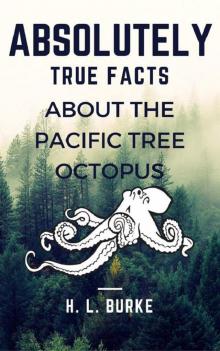 Absolutely True Facts About the Pacific Tree Octopus
Absolutely True Facts About the Pacific Tree Octopus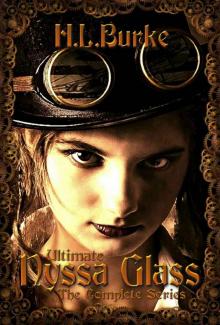 Ultimate Nyssa Glass
Ultimate Nyssa Glass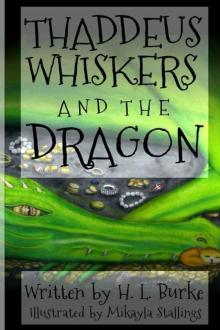 Thaddeus Whiskers and the Dragon
Thaddeus Whiskers and the Dragon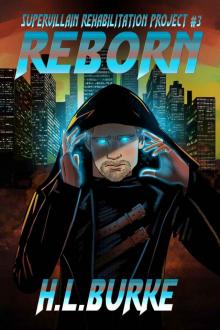 Reborn (Supervillain Rehabilitation Project Book 3)
Reborn (Supervillain Rehabilitation Project Book 3)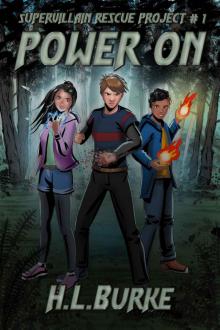 Power On: Supervillain Rescue Project
Power On: Supervillain Rescue Project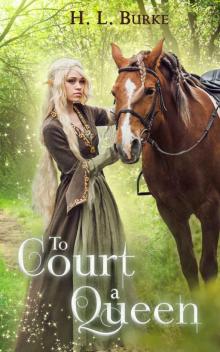 To Court a Queen
To Court a Queen Prince of Stars, Son of Fate
Prince of Stars, Son of Fate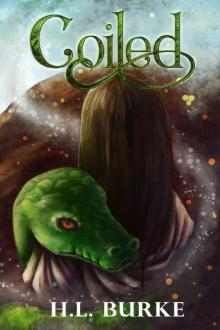 Coiled
Coiled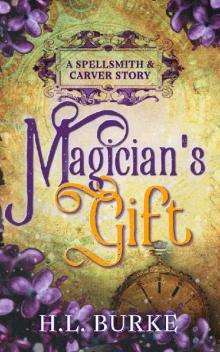 Magician's Gift:
Magician's Gift: Reformed
Reformed Daughter of Sun, Bride of Ice
Daughter of Sun, Bride of Ice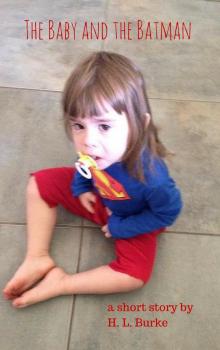 The Baby and the Batman
The Baby and the Batman Magicians' Trial
Magicians' Trial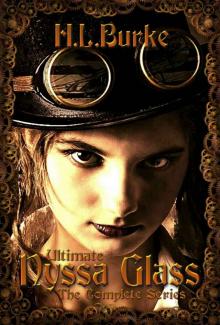 Ultimate Nyssa Glass: The Complete Series
Ultimate Nyssa Glass: The Complete Series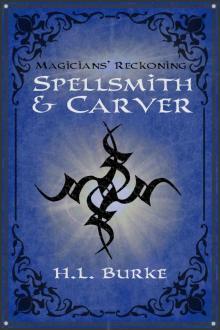 Spellsmith & Carver: Magicians' Reckoning
Spellsmith & Carver: Magicians' Reckoning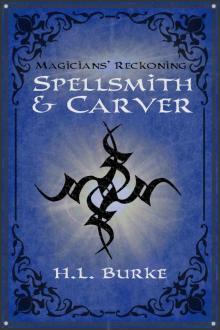 Magicians' Reckoning
Magicians' Reckoning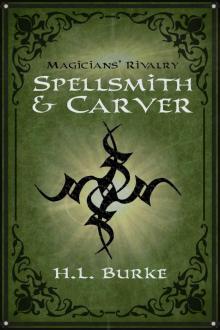 Spellsmith & Carver: Magicians' Rivalry
Spellsmith & Carver: Magicians' Rivalry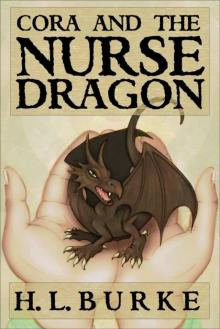 Cora and the Nurse Dragon
Cora and the Nurse Dragon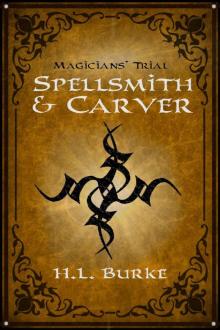 Spellsmith & Carver: Magicians' Trial
Spellsmith & Carver: Magicians' Trial